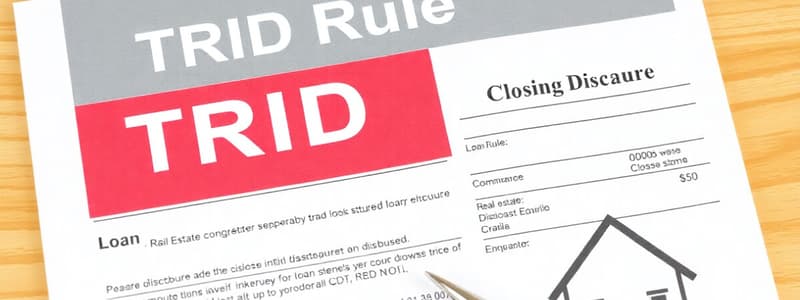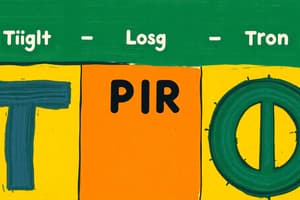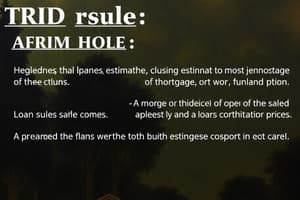Podcast
Questions and Answers
What must lenders provide to consumers at the time of loan application?
What must lenders provide to consumers at the time of loan application?
- A copy of the Closing Disclosure form
- A list of all potential charges
- A copy of the booklet 'Your Home Loan Toolkit' (correct)
- A copy of the Loan Estimate form
What is considered a 'business day' for lenders under the TILA/RESPA rules?
What is considered a 'business day' for lenders under the TILA/RESPA rules?
- Only the days of loan closings
- Only weekdays excluding holidays
- Any calendar day except Sundays and public holidays (correct)
- Any day except weekends
What does 'consummation' refer to in the context of a loan?
What does 'consummation' refer to in the context of a loan?
- The day the borrower becomes indebted to the creditor (correct)
- The day the closing transaction occurs
- The day the loan documents are signed
- The day the loan is applied for
How is good faith measured in relation to Loan Estimates and actual charges?
How is good faith measured in relation to Loan Estimates and actual charges?
Which of the following documents must be delivered or mailed to the consumer within three business days after receiving a loan application?
Which of the following documents must be delivered or mailed to the consumer within three business days after receiving a loan application?
What must creditors ensure regarding the figures in the Loan Estimate?
What must creditors ensure regarding the figures in the Loan Estimate?
For certain costs or terms, creditors can charge consumers more than disclosed on the Loan Estimate without any limitations on which of the following?
For certain costs or terms, creditors can charge consumers more than disclosed on the Loan Estimate without any limitations on which of the following?
What is the purpose of the TILA/RESPA Integrated Disclosures (TRID) rule introduced on October 3, 2015?
What is the purpose of the TILA/RESPA Integrated Disclosures (TRID) rule introduced on October 3, 2015?
What must the creditor indicate when an amount has changed in the closing costs?
What must the creditor indicate when an amount has changed in the closing costs?
What is the 'Cash to Close' amount?
What is the 'Cash to Close' amount?
Which of the following is included in the borrower's transactions at closing?
Which of the following is included in the borrower's transactions at closing?
What is indicated in the seller's column regarding amounts due at closing?
What is indicated in the seller's column regarding amounts due at closing?
What is the purpose of Page 4 in the Closing Disclosure?
What is the purpose of Page 4 in the Closing Disclosure?
Which document must real estate brokers file under the Tax Reform Act of 1986?
Which document must real estate brokers file under the Tax Reform Act of 1986?
What does the 'Security Interest' section in Page 4 identify?
What does the 'Security Interest' section in Page 4 identify?
What does the 10% cumulative tolerance allow creditors to do regarding certain charges?
What does the 10% cumulative tolerance allow creditors to do regarding certain charges?
What information does Form 1099-S include?
What information does Form 1099-S include?
Which of the following charges is NOT subject to zero tolerance?
Which of the following charges is NOT subject to zero tolerance?
In the calculation of 'Cash to Seller', what is considered?
In the calculation of 'Cash to Seller', what is considered?
What is required if the closing costs exceed the amounts disclosed beyond the applicable tolerance threshold?
What is required if the closing costs exceed the amounts disclosed beyond the applicable tolerance threshold?
What does the 'Late Payment' section of Page 4 inform the borrower?
What does the 'Late Payment' section of Page 4 inform the borrower?
Which type of loan is explicitly excluded from the Integrated Disclosures rule?
Which type of loan is explicitly excluded from the Integrated Disclosures rule?
If total closing costs exceed the legal limits, what must the creditor disclose?
If total closing costs exceed the legal limits, what must the creditor disclose?
What does 'Negative Amortization' refer to in loan disclosures?
What does 'Negative Amortization' refer to in loan disclosures?
What does the Loan Terms section on the H-25 Closing Disclosure primarily list?
What does the Loan Terms section on the H-25 Closing Disclosure primarily list?
In the H-25 Closing Disclosure, where is the total amount of cash the buyer needs to close located?
In the H-25 Closing Disclosure, where is the total amount of cash the buyer needs to close located?
Which of the following elements may NOT be included in the borrower’s column at closing?
Which of the following elements may NOT be included in the borrower’s column at closing?
Which of the following items falls under 'Other Costs' on the H-25 Closing Disclosure?
Which of the following items falls under 'Other Costs' on the H-25 Closing Disclosure?
What type of mortgage is subject to the Integrated Disclosures rule?
What type of mortgage is subject to the Integrated Disclosures rule?
Which of the following is an example of a zero tolerance charge?
Which of the following is an example of a zero tolerance charge?
What is the significance of the 'general information' section in the H-25 Closing Disclosure?
What is the significance of the 'general information' section in the H-25 Closing Disclosure?
What is the total cost of transactions paid by the borrower derived from?
What is the total cost of transactions paid by the borrower derived from?
In what section of the H-25 Closing Disclosure are the costs paid by others displayed?
In what section of the H-25 Closing Disclosure are the costs paid by others displayed?
Which of the following best describes the 'Costs at Closing' section of Page 1?
Which of the following best describes the 'Costs at Closing' section of Page 1?
What type of costs does the Loan Costs section encompass?
What type of costs does the Loan Costs section encompass?
Flashcards are hidden until you start studying
Study Notes
TILA/RESPA Integrated Disclosures (TRID) Rule
- Implemented on October 3, 2015, replacing older forms and procedures.
Loan Estimate (Form H-24)
- Must be delivered to the consumer no later than the third business day after receiving a loan application.
- Application is considered complete when the consumer provides the lender or mortgage broker with six pieces of information: name, income, Social Security number, property address, estimated value of property, and loan amount sought.
- Lenders are responsible for ensuring the information is good faith and accurate based on the best information reasonably available at the time.
Closing Disclosure (Form H-25)
- Must be provided to the consumer at least three business days before loan consummation.
- Consummation is the day the borrower becomes indebted to the creditor, which may or may not coincide with the closing date.
Good Faith
- Measured by comparing the estimated charges in the Loan Estimate to the actual charges paid in the Closing Disclosure.
- Generally, charges exceeding the originally disclosed amounts are not considered good faith, even with technical errors, miscalculations, or underestimations.
- Exceptions may apply for certain costs.
Types of Charges
- Charges for services required by the creditor, where the consumer shops and selects a third-party service provider not on the creditor's list, are allowed without tolerance limitations.
- Charges for third-party services and recording fees paid by the consumer are subject to a 10% cumulative tolerance.
- All other charges have zero tolerance and cannot exceed the amount disclosed on the Loan Estimate except for changed circumstances permitting a revised Loan Estimate.
Applicable Transactions
- Applies to most closed-end consumer mortgages.
- Does not apply to home equity lines of credit (HELOCs), reverse mortgages, mortgages secured by mobile homes or dwellings not attached to real property, or loans made by borrowers who are not considered creditors due to making five or fewer mortgages in a year.
- Now includes construction-only loans, loans secured by vacant land or 25 or more acres, and credit extended to certain trusts for tax or estate planning.
The H-25 Closing Disclosure Form
- Consists of five pages.
- Page 1 includes general information, loan terms, projected payments, and costs at closing.
- Page 2 details closing costs, including loan costs and other transaction-related costs.
- Page 3 calculates cash to close and summarizes transactions for both borrower and seller.
- Page 4 provides additional loan disclosures, such as assumptions, demand features, late payment fees, negative amortization, partial payments, security interest, and escrow account details.
- Page 5 includes loan calculations, other disclosures, and contact information for all parties involved.
Reporting Requirements
- The Tax Reform Act of 1986 requires reporting of closed real estate transactions to the Internal Revenue Service.
- "Real estate brokers" are required to report, including the seller's broker, buyer's broker, settlement agent, escrow agent, attorney, title company, mortgage lender, and designated parties by the Internal Revenue Service.
- A Form 1099-S information return must be filed, including the names and addresses of parties and information about the sale proceeds.
- A written statement with the same details must be provided to each party involved.
- Additional reporting and withholding responsibilities may apply if the transaction involves a non-resident alien.
Studying That Suits You
Use AI to generate personalized quizzes and flashcards to suit your learning preferences.




